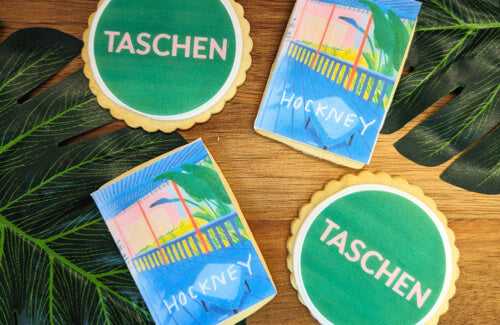With one half of The Biskery hailing from Nuremberg, we had to add Elisen-Lebkuchen to our product range as soon as the first Christmas was approaching. And man did they fly off the shelves! But what are (authentic) Lebkuchen, what does the word mean, and what is so special about this particular German Christmas biscuit?

Does Lebkuchen = Gingerbread?
First things first: although “Lebkuchen” translates as gingerbread this is totally misleading. Whilst the special spice blend used in Lebkuchen contains ground ginger, it is nowhere near as prominent in taste as it is in a British gingerbread biscuit. Elisen-Lebkuchen are softer, contain nuts and are glazed with chocolate or icing. The consistency is cake-like and they are usually round and baked on top of a traditional thin rice paper (called Oblate, which is why they are also called “Oblatenlebkuchen” in Germany).
Authentic Elisen-Lebkuchen covered in chocolate and icing stacked on top of each other. Tied together with a yellow ribbon.
Highest quality
Elisen-Lebkuchen are the highest quality authentic Lebkuchen you can find. Meaning they must contain at least 25% nuts and no more than 10% wheat flour. The finest artisan Lebkuchen bakeries in Nuremberg boast close to 40% nut content, and so do ours. Plus we don’t use any flour in our Lebkuchen mix. There is however a bit of flour in the rice paper that the biscuit sits on. The iced version are dairy-free. This means they can be enjoyed by a wide range of food lovers with food intolerances.

You can find this hugely popular German Christmas biscuit in the popular supermarket chains such as Lidl, Aldi (both German), Tesco, Sainsbury’s, etc. over the holiday seasons. But these varieties pale in comparison to the authentic variety that we make. The supermarket varieties are over-processed. This takes away the delightful natural bite of the citrusy mixed peel. Their high volume of flour and sugar also makes the biscuits drier than you want them to be. To try the artisan product is to know what makes proper Lebkuchen so special.
We think ours are the best outside of Nuremberg and therefore we have proudly named them:
Eleedsen-lebkuchen
Legend has it…
Legend has it, that these high-quality biscuits were named Elisen-Lebkuchen by a baker whose daughter was called Elisabeth; who sadly died aged 17. As it turns out, St. Elisabeth is also the patron saint of all bakers. So, an Elisen-Lebkuchen is, indeed, the queen of German gingerbread.
In Nuremberg, the town famous for its Christmas market, you can find the world’s best Elisen-Lebkuchen. Since 1996, Lebkuchen from Nuremberg can be called “Nürnberger Lebkuchen“, as a quality seal.
If you have ever been lucky enough to visit Germany and in particular Nuremberg at Christmas time, you will have noticed that the Nuremberg-style Lebkuchen are typically packaged in highly decorative tins. Each year these exquisite tins get a new design, and are shared as holiday gifts among friends and family. We hope that the The Biskery’s premium Lebkuchen tins (that we design every year with local students) will carry on this tradition of love, friendship and coming together through food each Christmas.
How do you pronounce Lebkuchen?
For the curious lot who are left wondering how to actually pronounce this wonderful word with the popular ‘harsh’ sounding German ‘ch’ sound in it… we will leave you with the following instructions for you to practice at home. The Brits will get away with leyb-koo-kuhn. However, if you can manage, then the proper pronunciation is: leyb-koo-khuhn. If you are still not sure then let us teach you.
Our Lebkuchen are available in our shop from November till January every year.







